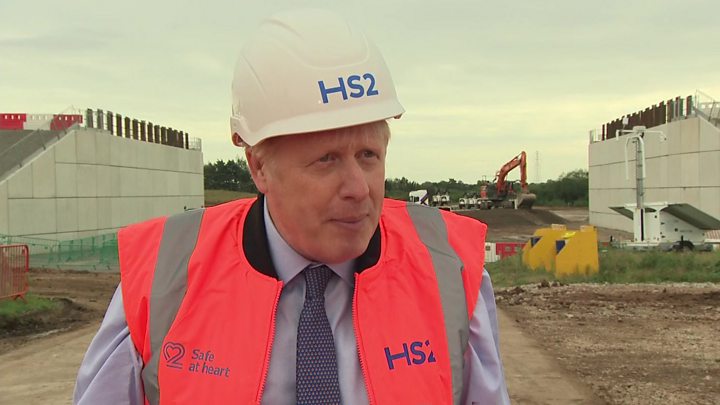Media playback is unsupported on your device
The UK is “sleepwalking into a disaster” over its border plans for the end of the Brexit transition period on 31 December, road hauliers have warned.
Groups representing truckers have written to ministers warning of “severe” disruption to supply chains.
Rod McKenzie, from the Road Haulage Association, said the government should “act now before it’s too late”.
But Boris Johnson said the UK was “ready for any eventuality” after the transition period.
The government has also given itself powers to build temporary lorry parks in England without local approval.
However, Mr McKenzie told BBC News: “It is a real case of the government sleepwalking to a disaster with the border preparations that we have, whether it is a deal or no-deal Brexit at the end of December.
“The supply chain on which we are all dependent to get the things we need could be disrupted and there is a lack of government focus and action on this.”
He added: “When we are trying to emerge from the crisis of Covid, if we then plunge straight into a Brexit-related crisis, that will be a really difficult moment and we need real pace.
“The difference here is between a disaster area and a disaster area with rocket boosters on.”
Labour’s shadow cabinet office minister, Rachel Reeves, said the government “must urgently come forward with a plan to put workable solutions in place”.
Speaking to reporters on Friday, Mr Johnson said: “We must make sure that people understand at the end of the year, whatever happens, we’re leaving the EU, leaving the transition period.
“That’s why it is vital that people who have questions about what they need to do get onto our government websites … look at what they need to do to prepare, and certainly, we will help them.
“But we will get through this.”

Media playback is unsupported on your device
The UK left the European Union on 31 January, but a transition period – where the UK continues to follow some of the bloc’s rules – remains in place until 31 December while the two sides negotiate a trade agreement.
However, trade talks have been taking place since March and both sides have complained of little progress being made.
If a deal is not agreed and ratified by parliaments by the end of the year, the UK will go into 2021 trading with the bloc on World Trade Organization rules, which critics fear cause issues at the border.
In a letter to the Cabinet Office Minister Michael Gove, seen by Bloomberg, eight logistics organisations – including the Road Haulage Association – raised concerns over IT systems, the funding to train up customs agents and the pace of physical infrastructure being built.
They asked for an “urgent roundtable meeting” with Mr Gove, Chancellor Rishi Sunak and Transport Secretary Grants Shapps, saying supply chain must be protected ahead of a potential second wave of the coronavirus pandemic.
Mr Shapps said he regularly met the Road Haulage Association and wanted to reassure them “planning for the end of the transition period hasn’t stopped” during the coronavirus outbreak.
He told BBC Radio 4’s Today programme he “could not pre-empt the outcome” of trade talks with the EU, which he conceded created “some uncertainty”.
But, he said the government had kept supply changes going throughout the pandemic and “we are absolutely confident we will do that again in the future”.
Why could trade be disrupted?
Image copyright
Getty Images
Analysis by Sebastien Ash, BBC political analyst
On 1 January 2021, the way that UK businesses trade with the EU will fundamentally change.
It’ll mean new hurdles for traders to clear, including the need to fill in customs declarations – forms with detailed information on goods being imported and exported.
For the first six months of this new era – and whatever the outcome of the negotiations between the UK and the EU – goods entering the UK will not have to complete these processes, as they normally would, at the border.
Instead, the government is giving businesses time to file their paperwork and pay the duties they owe after the goods have entered the UK.
This exceptional measure is designed to mitigate the risk of delays for goods coming into the UK.
However, for goods being exported the concern is greater. The EU has said it will impose its normal controls. And on the UK side, key systems to manage the flow of lorries at the UK border and make sure consignments are cleared to proceed to the EU are not up and running.
The concern among the industry is that this could lead to lorries being refused entry onto ferries headed for the EU, long tail-backs at the ports through which much of the UK’s trade with the EU flows and slow down and disrupt the supply chains between UK and EU businesses.
In short, it becomes hard to conduct business as usual if you can’t get your goods to the customer.
Shane Brennan, chief executive of the Cold Chain Federation – another of the groups who wrote the letter – acknowledged the government was carrying out work on the necessary systems now.
But he said there was “no time to get these systems in place to actually do the job effectively”.
He told BBC News: “The supply chain leaders will try to do everything they can to avoid shortages on the shelves, but at its worst, at the extreme, these sorts of situations will lead to food shortages.”
Earlier this week, the EU’s chief negotiator, Michel Barnier, said the UK was risking leaving the transition period without a deal unless it began to compromise.
He said he was “worried and disappointed” about the lack of concessions from his British counterpart, David Frost, after a trade deal meeting on Tuesday.
No 10 said it was “clear” that a deal “will not be easy to achieve”.

Media playback is unsupported on your device
Lorry park plans
The logistics industry letter came as the government gave itself powers to grant emergency planning permission for it to build temporary lorry parks and inspection posts in 29 councils areas across England, without the need for local approval.
The government said the lorry parks, which can stay in place until the end of 2025, would contribute to “an orderly transition to the new system of controls to secure the border” and would help to address the impact coronavirus may have had on port operators’ ability to provide the necessary infrastructure themselves, in time for the end of the transition period.
Areas affected by the law change – brought about through a statutory instrument – include Cheshire, Lincolnshire, Liverpool, Devon, East Sussex.

